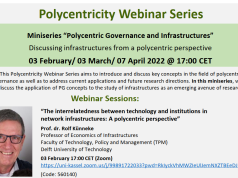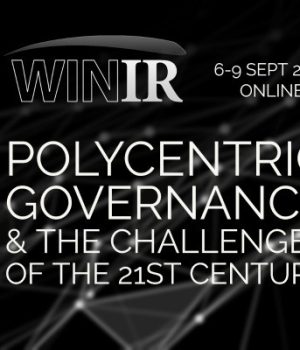Upcoming Special Feature in Sustainability Science
The analysis of Networks of Action Situations (NAS) is becoming an increasingly popular and powerful tool for social-ecological systems research. Social-ecological systems are frequently shaped by decisions, behaviours and practices resulting from multiple interdependent action situations (e.g., Pahl- Wostl et al. 2010; McGinnis 2011;
Lubell 2013; Kimmich 2013; Villamayor et al. 2015). Action situations are events, venues, arenas or spaces in which actions affect collective outcomes (Ostrom 2005). The action situations relevant to sustainability science are highly diverse. They include market transactions, resource extraction, public good provision, deliberative fora, implementation of legislation and many more. Typically, social (e.g. social networks and institutions), economic (e.g. shared resources and transactions) and biophysical (e.g. material and energy flows) ties link action situations and the actors involved in multiple
situations. Such complex networks lack systematic research. How can we account
for the heterogeneity of networks and the distinct characteristics of
situations and their linkages? Which methods and models appear most promising?
How can NAS contribute to middle-range theory building?
Objectives
This special feature aims to:
- (A) consolidate the NAS approach by examining conceptualizations of networks and action situations and by synthesizing the portfolio of available methods and models to
analyse NAS; - (B) explore how theoretical, empirical and transdisciplinary research uses
situation-centred network approaches to advance network analysis and
synthesis in sustainability science; - (C) identify those situations and network structures in empirical cases that promise to be
powerful levers in the transformation of social-ecological systems to
sustainable futures.
We invite contributions that advance theory, methods and empirical insights of NAS research, covering a variety of
approaches, including ecologies of games, connectivity science, polycentricity,
archetypes approaches, telecoupling and nexus studies, as well as political
economy and political ecology studies, ecologies of practices and actor-network
approaches.
The special feature builds on a series of conference panels that have been
organized at the ESEE 2019, the IASC 2019, the ECPR 2020 and the ESG 2020. It
aims to include a number of high-quality articles that complement invited
contributions from the panels.
Deadlines
Expressions of interest are due on 31 August 2020. Please submit a working title, authors’ names and an abstract of 200-250 words in an email to the editors. Full papers need to be submitted by the end of May 2021. We provide further detail for full paper submissions once the planned contributions have been selected. Papers will be published online as soon as they are accepted.
Special Feature Editors
Dr. Christian Kimmich, IAS Vienna, AT,
and Masaryk University Brno, CZ (kimmich@fss.muni.cz)
Dr. Melf-Hinrich Ehlers, ETH Zürich, CH (melf.ehlers@ethz.ch)
Dr. Elke Kellner, Swiss Federal Research Institute WSL, Birmensdorf, CH (elke.kellner@wsl.ch)
Dr. Christoph Oberlack, University of Bern, CH (christoph.oberlack@cde.unibe.ch)
Prof. Dr. Andreas Thiel, University of Kassel, DE (thiel@uni-kassel.de)
Dr. Sergio Villamayor-Tomas, Autonomous University Barcelona, ES (sergio.villamayor@uab.cat)
Find the PDF version of this call here













